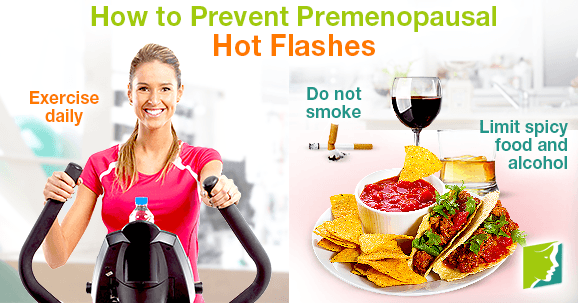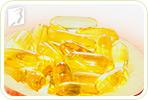Premenopause is the stage of a woman's life when she generally has normal menstrual cycles and sexual functionality. This is before perimenopause, the time when menopause symptoms typically begin to show. Although hot flashes are most common during the latter stages, many women report these episodes early on as well. During menopause, the causes are largely due to the decrease in the sex hormones estrogen and progesterone. Since hormone levels are typically normal during premenopause, most women don't experience hot flashes until they are older. However, certain disorders and factors can cause hot flashes, and they may even be triggered by lifestyle choices that raise body heat or cause your hormone levels to become erratic. Avoiding these triggers can help prevent premenopausal hot flashes.
Limit Spicy Food Consumption
Spicy food is known to speed metabolic rate, which can prompt symptoms of hot flashes. It is studied to have a significant thermic effect on the body via an increased heart rate and surge of blood and energy. You may not trace the episode back to spices because the effect tends to peak two or three hours after you eat. However, there are cases when the spices can make you feel sweaty and panicky right away. Try to remove spicy dishes from your diet for now.
Limit Alcohol Intake
Alcohol also has a dramatic impact on your metabolic rate. While one drink is usually fine, excessive intake will profoundly increase body temperature. Energy levels sharply increase, along with testosterone levels, which can make you feel like you just did an hour-long workout. Blood vessels will dilate, causing redness and a burning feeling under your skin. Take note if you find a pattern in your own alcohol consumption and hot flash episodes. Luckily, this is a modifiable risk factor, meaning its effect is completely under your control.
Do Not Smoke
The human body has little tolerance for cigarettes. Not only do they destroy your ability to breathe deeply, which helps you calm down during a flash, but they are also scientifically shown to increase the severity, frequency, and duration of your hot flashes. In addition, smoking lowers estrogen levels in females, making smokers even more susceptible to flashes. In fact, chronic smoking can lead to early menopause. If you have tried quitting in the past, take this as a perfect time to drop the habit for good. When you do, symptoms can be reduced by 85%.
Exercise Daily
If you do not exercise frequently, your body may not be used to the quickened heart rate that some hot flash episodes bring, which can lead to more sweating and panic. Also, people who are obese are significantly more likely to experience severe episodes. To regulate blood and oxygen circulation while releasing relaxing endorphins, exercise daily. A 30-minute cardio workout or yoga session will prepare your body and reduce flashes, keeping you cool and in shape.
If hot flashes are creeping into your life before menopause, it is essential that you make a checklist of these four tips. Adequate exercise paired with avoidance of the three most common triggers can bring extreme relief. Enjoy life to the fullest without pesky surges of heat getting in the way of your productivity and happiness.
Sources
- Better Health Channel. (2013). Metabolism. Retrieved March 6, 2014, from http://www.betterhealth.vic.gov.au/bhcv2/bhcarticles.nsf/pages/Metabolism_explained
- Henry, C.J. & Emery, B. (1986). Effects of spiced food on metabolic rate. Human nutrition, clinical nutrition, 40(2), 165-168. Retrieved from http://www.ncbi.nlm.nih.gov/pubmed/3957721
- Schilling, C. et al. (2007). Current Alcohol Use, Hormone Levels, and Hot Flashes in Midlife Women. Fertility and sterility, 87(6), 1483-1486. doi: 10.1016/j.fertnstert.2006.11.033
- U.S. Department of Health and Human Services. (n.d). Health Effects. Retrieved March 6, 2014, from http://smokefree.gov/health-effects
- Whiteman, M.K. et al. (2003). Smoking, Body Mass, and Hot Flashes in Midlife Women. Obstetrics and gynecology, 101(2), 264-272. Retrieved from http://www.ncbi.nlm.nih.gov/pubmed/12576249




